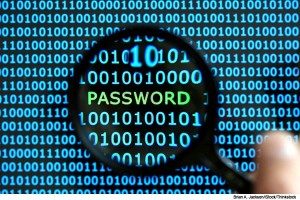 Your password is the key to your online identity – a key much sought‐after by hackers as a means of gaining entrance to your computer system or to accounts you access on the Internet.
Your password is the key to your online identity – a key much sought‐after by hackers as a means of gaining entrance to your computer system or to accounts you access on the Internet.
Here are some suggestions for creating a strong password that can reduce your exposure to hacking.
General Password Guidelines
Choose a strong password by including a combination of:
- lower and upper case letters, a‐z
- special characters, (~!@#$%^&*?<>.)
- numbers
Don’t place all your eggs in one basket! Create a different password for each website you use; this protects you if the password on one site becomes compromised. Use passwords of adequate length to protect your information from bad guys and their password crackers. Longer passwords are always better: Generally use passwords at least eight characters long and strive for even longer ones.
Remembering Your Password
Here are some techniques that may make your password easier to remember:
- Use phrases separated by special characters
- Use memory techniques to help remember passwords
For example, the phrase “The Cow Jumped Over The Moon” and your favorite number “33” produces the password “TCJOTM33!” Make up your own phrase: “I Got A New Car Last April” and the day of the month generates “12IganclA”
Don’t use weak passwords, such as “password,” “123456,” “security,” “coffee,” “spring,” “summer,” “winter,” “fall.”
What to Avoid When Choosing a Password
Never use:
- your user name
- login name
- personal information that can be guessed, such as the name of your child or pet, your car license plate or birthdates
Avoid repeating or sequential password patterns.
Don’t share passwords with others or write them down! If you absolutely must write them down, store them in a secure place where they are less likely to be lost or stolen, or use a secure password storage program that encrypts the data.
Article compliments of The Cincinnati Insurance Group

Recent Comments